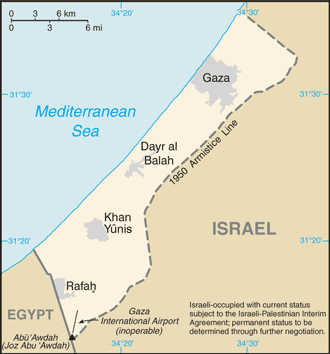The Institute for the Study of Diplomacy at Georgetown University may not have a course entitled “Demonization as foreign policy” . . . but it should.
The unsuspecting public may be duped, and the mainstream press may not have the energy to investigate the stories they’re fed, but it’s becoming clearer to me every day that “WE” are being deliberately manipulated.
* WE = you, me and the average consumer of news. It may also include members of Congress who are ill-informed about international policy, and gullible elected officials who don’t ask the tough questions.
Before I visited the Gaza Strip (September 2012 – May 2013) I considered myself an intelligent American who had a fair knowledge (perhaps better than the average person) about the current events in the Middle East. I knew about the division between Fatah and Hamas. I knew that my government supports Fatah in the West Bank and labels Hamas a FTO = “foreign terrorist organization.” I knew about the Egyptian authorities collaborating with Israel to keep a tight grip on Palestinians’ movement in and out of the Gaza Strip.
But I’ve learned much, much more in the past year. The biggest lesson I learned was to ask “Why?” more often. The answers I found convinced me that the real substance of foreign policy occurs out of public view with agendas that are outside of public debate.
- Why are the Egyptian media and military leaders blaming Hamas and Palestinians in Gaza for the current unrest in the Sinai and Cairo?
Clearly, a deliberate strategy of demonization is underway. Palestinian-American Ramzy Baroud shares a very personal experience of how this demonization worked 20 years ago and continues today with a vengeance. He writes:
The odd thing is that Hamas’s biggest campaign during Morsi’s 12-months in power was for Egypt to replace the tunnels it actively destroyed with a free trade zone that gave Palestinians an economic lifeline to brave the siege. Little was achieved then, and nearly 80 percent of the tunnels are now destroyed.

A model of development proposed for the new international trade zone between Gaza and Egypt, designed by students at the Islamic University of Gaza.
I’ve been concerned about how Hamas can prove a negative. How does it prove to the world that it’s not involved or provoking the increased violence in the Sinai? It’s difficult to prove a negative, see here.
Now Hamas has disclosed documents that link Fatah and Abbas with the “news” coming out of Egypt.
The documents also list Abbas’s accomplices in this shameful campaign, including Tayeb Abdel Rahim and various security agencies in Ramallah. The evidence is in the form of letters to news sources containing false information purporting to link Hamas to the latest events in Egypt and interfering in Egyptian affairs. One of the letters is addressed to Jihad Harazin, the official in charge of media in the Palestinian Embassy in Cairo. “Based on the recommendation of security agencies led by Abbas, a new department has been formed to contribute information to the media industry,” it informed Harazin. “Among the goals of this department is to develop ways to embarrass Hamas and link the group to the events in Egypt.”
Is the western media capable of asking the tough questions and looking behind the curtain? If not, then “WE” need to be asking “WHY?”


